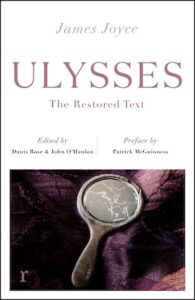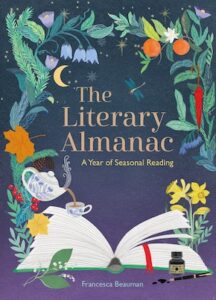Reading Ulysses
by Francesca Beauman
“The question is not ‘what is a novel?’, but what can a novel be? Ulysses is the answer.” Patrick McGuinness
When I was 22, I spent the month of June travelling around the Balkans by myself. I was trying to heal a broken heart, having been unexpectedly dumped by a boyfriend. Night after night, I ate supper alone in a taverna with just my book for company. The book in question was not only one of the longest in the English language (which was lucky, because it easily lasted me the whole trip), but is also often perceived as one of the most difficult. But what else was I going to do? Re-read the rakia menu?
And this is what became clear to me over a series of seafood spaghetti dishes. Ulysses is one of the funniest books you will ever read, as well as the very definition of ‘un-boring’. A silly, absurd, hilarious outpouring of all that is miraculous about the English language, the key is not to take it seriously, ever, in any way, at all. This is one reason why the book should be read during the most joyous of months, June, which always feels so marvellously full of potential. The other reason is that the entirety of Ulysses is set on a single day in June: on the 16th, to be precise, in 1904, which also happens to be when James Joyce first stepped out with his wife-to-be, Nora Barnacle.
James Joyce was born in Dublin in 1882, the eldest of ten children. He spent most of his adulthood living a precarious existence travelling between Paris, Zurich and Trieste with Nora and their two children, Giorgio and Lucia. He worked on Ulysses throughout the course of the First World War; it was published in 1922 on his 40th birthday.
It is entirely permissible and even sensible to skip some bits of Ulysses. In a way, that is its wonder.”
Ulysses was inspired by the ancient Greek writer Homer’s epic poem The Odyssey. Joyce changes the name of the wandering hero from Odysseus to Leopold Bloom, re-imagining him as an Irish Jew going about his ordinary day. At the same time, Joyce eschews literary convention in order to invent an entirely new way of expressing himself, mainly through putting streams of consciousness on paper. There are parallels to be found in the emergence of new forms of music such as rock ’n’ roll or grime: it is still music, but unlike anything that has gone before. The way to read Ulysses, therefore, is to come at the text more for the general feel of it than the specifics of plot or character. For Ulysses offers the ultimate expression of the power and beauty of the English language; to seek out narrative is somewhat to miss the point.
 It is, therefore, entirely permissible and even sensible to skip some bits of Ulysses. In a way, that is its wonder: structured into 18 ‘episodes’, each differs hugely from the others, including in terms of appeal and accessibility. It opens in a jolly fashion as two young men, Buck Mulligan and Stephen Dedalus, chat, argue and scoff breakfast, building beautifully to Episode 4, which draws the reader in with its glorious description of Bloom’s breakfast, then zips along around the streets of Dublin until we meet Bloom’s wife Molly, who is still in bed and thinking about her lover.
It is, therefore, entirely permissible and even sensible to skip some bits of Ulysses. In a way, that is its wonder: structured into 18 ‘episodes’, each differs hugely from the others, including in terms of appeal and accessibility. It opens in a jolly fashion as two young men, Buck Mulligan and Stephen Dedalus, chat, argue and scoff breakfast, building beautifully to Episode 4, which draws the reader in with its glorious description of Bloom’s breakfast, then zips along around the streets of Dublin until we meet Bloom’s wife Molly, who is still in bed and thinking about her lover.
The best episodes? Well, I adore Episode 14 for the silliness of its language, especially towards the end when Leopold is in the pub getting roaringly drunk: ‘Come on, you winefizzling ginsizzling booseguzzling existences!’ is how I, too, persuade my friends to hurry up and finish their drinks before the chip shop closes. Episode 17, meanwhile, is an exquisite feat of linguistic invention: Leopold muses on everything from the advantages of shaving at nighttime to what he admires most about water. It is verbose, overblown and ridiculous, and I love it with a passion.
But it is the last episode in the book, Episode 18, that will always be closest to my heart. The reader is invited to eavesdrop on Molly Bloom’s interior monologue as she lies in bed next to her husband. The writing style closely mimics Nora Joyce’s in her letters to her husband, in particular the unpunctuated meandering of passionate feeling as well as the unsurpassable turn of phrase, for example her mockery of an erect penis as ‘sticking up at you like a hatrack’. Molly also illustrates more vividly than almost any of the other characters what is, in my view, the central theme of Ulysses: the heroism in the everyday. Just getting through is enough, right?
Extracted from The Literary Almanac: A Year of Seasonal Reading (Greenfinch, September 2021)
 Francesca Beauman spent a decade as a TV presenter and is now a writer, historian and part-time bookseller at Persephone Books in Bath. She has published seven books, including a history of the pineapple, The Pineapple: King of Fruits (Chatto & Windus, 2005), and a history of personal ads, Matrimony, Inc. (Pegasus Books, 2020). She was born in London, studied History at Cambridge, and now lives in Bath. The Literary Almanac is published on 23 September in hardback and eBook by Greenfinch, an imprint of Quercus Books.
Francesca Beauman spent a decade as a TV presenter and is now a writer, historian and part-time bookseller at Persephone Books in Bath. She has published seven books, including a history of the pineapple, The Pineapple: King of Fruits (Chatto & Windus, 2005), and a history of personal ads, Matrimony, Inc. (Pegasus Books, 2020). She was born in London, studied History at Cambridge, and now lives in Bath. The Literary Almanac is published on 23 September in hardback and eBook by Greenfinch, an imprint of Quercus Books.
Pre-order from Bookshop.org
More info at Quercus Books
francescabeauman.com
instagram.com/francescabeauman
@francescabeauma
Author portrait © Kris Keevers
A new edition of Ulysses (above), edited by Danis Rose and John O’Hanlon and with a preface by Patrick McGuinness, restoring the changes to the text that were approved by Joyce during his lifetime, is out now in paperback and eBook from riverrun editions.
Read more

